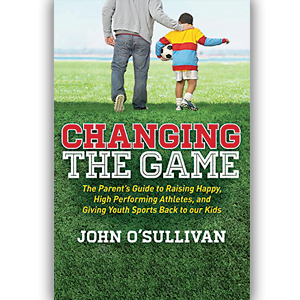
Taking Back Youth Sports: A Review of Changing the Game
With sports and kids’ extra-curricular schedules ever on parents’ minds, I decided to blog about Changing the Game by John O’Sullivan in the hopes of giving parents pause before signing their children up for fall sports. According to O’Sullivan, “Seventy percent of kids drop out of organized sports by age 13.” O’Sullivan claims, “Some children quit because of financial hardship, others because they acquire other interests, but many children quit because sports is no longer fun.” Therefore, if you’re interested in putting the “play” back in “play ball,” I highly recommend you check out this book.
How did youth sports become so over-competitive and under-fun? O’Sullivan believes it’s the result of three myths:
Myth #1 – Children need to specialize early in a specific sport if they want to play competitively, play high school, play college, or even play professional sports.
Myth #2 – Sports, and especially travel and competitive-level sports, are an investment in a future scholarship or contract.
Myth #3 – Parents and coaches who want to develop high performers must focus on winning.
The reality is, according to O’Sullivan, “Since 1947, only twenty-three players who participated in the Little League World Series – the ultimate event for twelve-year-old baseball players – have also played in the major leagues.” So if you’re trading your kids’ free-time for more field time, think again. If you’re spending money on expensive coaches and athletic gear, stop. O’Sullivan claims, “The single greatest factor that affects performance can be developed absolutely free.” It’s a mindset.
According to O’Sullivan, “A high-performing mindset requires the absence, or at least a minimum, of the physical, emotional, and mental obstructions that many of our young athletes face:”
- The pressure to win
- The absence of enjoyment
- Excessive criticism and yelling
- Sports as work and not play
- Poor adult mentors
O’Sullivan argues there’s been a shift in paradigm in youth sports away from its most important purpose – “to develop character and core values based upon universally accepted social and ethical principles.” And O’Sullivan doesn’t believe it’s a coincidence that the current negative culture of youth sports coincides with the quick-fix mentality prevalent in American culture. He says, “We now expect instant solutions that get us in shape, help us lose weight, and make us feel better…We have become a society that lacks accountability for our current situation, and we feel entitled to quick and cost-effective remedies…We no longer realize that real solutions are only achieved through commitment, effort, and a process that starts from within.”
We can all pretty much agree that youth sports look a lot different now than they did when we were growing up. While O’Sullivan explains, “Some parents tell him that when they were kids they played all the time and their kids can too,” O’Sullivan is quick to remind people, “We played for fun and not under the watch of our parents or adult supervisors each and every day.” That’s part of the reason I find the trend of parents staying to watch practices, in addition to games, troubling. Kids need time to experience the trial and error required to succeed in sports without an parenting ready to offer advice at all times.
Finally, in Changing the Game, O’Sullivan argues why it’s important parents stop chasing the scholarship myth. Sadly, “Only 3-5 percent of high school athletes even play in college, an even smaller number receive athletic financial aid,” reports O’Sullivan. “About one in one thousand high school athletes receives a (partial) college scholarship, and about one in thirteen thousand ever becomes a professional.” However, O’Sullivan is quick to note, “Between 30-50 percent of youth sports parents believe their child is good enough.”
As far as O’Sullivan is concerned, “The people responsible for this [trend in youth sports], and the only ones who can change it, are the adults.” So if you’re interested in giving youth sport back to your kids, then get Changing the Game – my new must-read parenting title – and check out this title for information on seven actionable principles for raising happy, high-performing athletes.
Follow @WinterhalterV on Twitter for updates on blog posts or like Parenting by the Book on Facebook.






